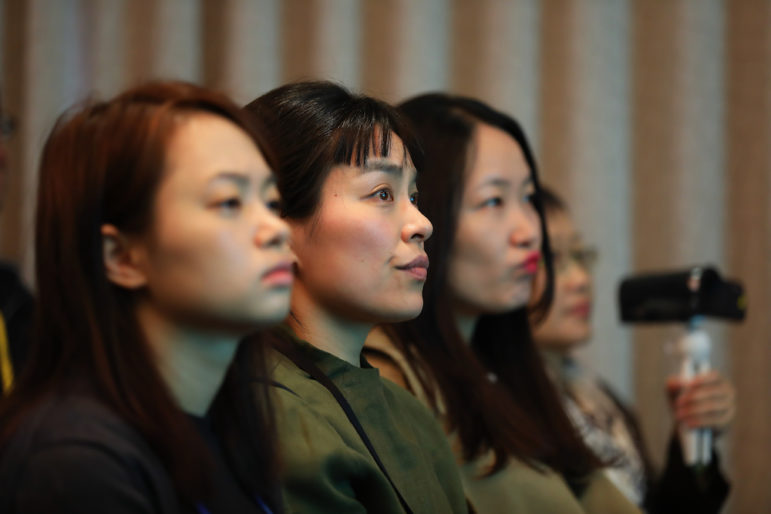
Leaning In: Journalists listened in on the powerful stories presented at the #MeToo in Asia panel. Photo: Taekyong Chung
It was a portentous day for a journalism panel on the #MeToo movement. One year ago today, The New York Times published their investigation about Hollywood mogul Harvey Weinstein’s widespread sexual abuse, which set in motion a charged conversation about sexual harassment and abuse around the world.
Moderated by Anne Koch, program director for GIJN, the panelists at the Uncovering Asia conference in Seoul spoke about the #MeToo movement in the US, China and Japan, and how best to report on sexual abuse crimes.
“We had a potential shift, right?” said Doreen Weisenhaus, a professor at Northwestern’s Medill School of Journalism and a specialist in media law. Weisenhaus remarked that while the US saw surges in legal decisions regarding sexual assault, Europe has passed an even larger number of legislations; France, for example, has banned catcalling, fining offenders.
Ying Chan, educator and consulting editor for GIJN in Chinese, talked about how sexual assault survivors and their supporters are trying to break through Chinese government censors to report sexual crimes, a topic she has written about for GIJN.
Chan says there are ways to get the story about #MeToo in China past government censors. For example, she said, social media users in the country are using the emojis of rice and rabbits because, when pronounced in Chinese, the two words sound similar to “me too” in English.
Chan wrapped up her talk with four tips for covering #MeToo in the autocratic society:
- Utilize user-generated content and back it up with solid journalism
- Cooperate with academics, activists and civil society groups
- When necessary, reporters can act as their own sources
- Rely on a combination of public discourse including pro-government media, mainstream media and social media
#MeToo in Japan
Journalist and a documentary filmmaker Shiori Ito spoke about her attempts to debunk taboos of sexual abuse allegations in Japan after she was sexually assaulted by a prominent TV journalist she had approached for career advice.
In Japan, even the word “rape” is taboo. But, Ito said, what happened to her after the assault was even more shocking. Police officers tried to convince her not to press charges, arguing it would ruin her career. She took the case the court anyway.
“If I can’t (speak) about the truth, I cannot be a journalist,” Ito said, admitting that it was her role as a reporter which helped her get through the difficult time. Ito put her experience and investigative skills to work on Japan’s sexual violence in the book Black Box, which won the 7th Free Press Association of Japan Best Journalism Award in 2018.
Ito emphasized the importance of ethically reporting on sexual assault. “We have to say: ‘I believe you,'” she said.
 sed in Seoul. She completed an internship with the investigative unit at Lithuania’s 15min, and is a freelance researcher at the Organized Crime and Corruption Reporting Project (OCCRP).
sed in Seoul. She completed an internship with the investigative unit at Lithuania’s 15min, and is a freelance researcher at the Organized Crime and Corruption Reporting Project (OCCRP).

